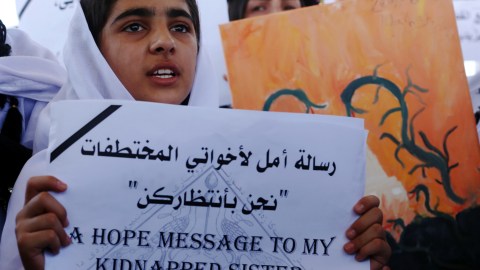Does Buying Sex Slaves Back From ISIS Fund Terrorism?

In a now famous New York Timesarticle, Rukmini Callimachi tells the following harrowing story about a young girl held captive by ISIS:
“In the moments before he raped the 12-year-old girl, the Islamic State fighter took the time to explain that what he was about to do was not a sin. Because the preteen girl practiced a religion other than Islam, the Quran not only gave him the right to rape her — it condoned and encouraged it, he insisted.”
“He bound her hands and gagged her. Then he knelt beside the bed and prostrated himself in prayer before getting on top of her.”
“When it was over, he knelt to pray again, bookending the rape with acts of religious devotion.”
“I kept telling him it hurts — please stop,” said the girl, whose body is so small an adult could circle her waist with two hands. “He told me that according to Islam he is allowed to rape an unbeliever. He said that by raping me, he is drawing closer to God,” she said in an interview alongside her family in a refugee camp here, to which she escaped after 11 months of captivity.”
In a horrific perversion of religious interpretation, ISIS routinely traffics and sells captured women and girls who are part of a religious minority group in Iraq known as the Yazidis. ISIS wrongly accuses them of being Satan worshippers as the Yazidis believe the devil to be a fallen angel who eventually was able to repent. And, therefore, ISIS allows their enslavement because they are mushriks (polytheists) and not protected under Quranic law.
In the fall of 2014, ISIS sought religious justification from its own clerics before engaging in the widespread enslavement of women within the group. In a pamphlet released by the group on the topic of female captives and slaves, ISIS addresses a number of questions:
Is it permissible to have intercourse with a female captive?
“It is permissible to have sexual intercourse with the female captive. Allah the almighty said: ‘[Successful are the believers] who guard their chastity, except from their wives or (the captives and slaves) that their right hands possess, for then they are free from blame [Quran 23:5-6]’…”
Is it permissible to have intercourse with a female slave who has not reached puberty?
“It is permissible to have intercourse with the female slave who hasn’t reached puberty if she is fit for intercourse; however if she is not fit for intercourse, then it is enough to enjoy her without intercourse.”
Is it permissible to beat a female slave?
“It is permissible to beat the female slave as a [form of] darb ta’deeb [disciplinary beating], [but] it is forbidden to [use] darb al-takseer [literally, breaking beating], [darb] al-tashaffi [beating for the purpose of achieving gratification], or [darb] al-ta’dheeb [torture beating]. Further, it is forbidden to hit the face.”
The Times reports that 5,270 Yazidis were abducted in 2014 and at least 3,144 are still held prisoner. In an October 2014 decree, ISIS set the price at around $170 USD for children between the ages of one and nine. The price rises about $40 by every 10-year increase in age.
In an attempt to rescue Yazidi women and children from ISIS, Steve Maman, a Canadian businessman, launched The Liberation of Christian and Yazidi Children of Iraq. Maman’s group solicits donations that he then uses to pay intermediaries to buy the enslaved women and children back from ISIS.
In an effort to raise funds, Maman set up a GoFundMe account. GoFundMe allows individuals to set up fundraising campaigns for just about any purpose. The site claims to have enabled groups and individuals to raise over $1 billion in the last year, with $4 million raised by users each day.
According to Foreign Policy, he had raised more than $500,000 before his campaign was shut down by the crowdfunding site. Through the actions of his group, he’s been accused of funding the same terrorists he’s rescuing the girls from. A spokesperson for GoFundMe told Foreign Policy “that this campaign may be violating local laws. … We are suspending the campaign and are going to investigate further,” she said.
Maman feels differently.
“I’m not funding ISIS; I’m not dealing with ISIS; I’m not talking to ISIS; I’m not paying ISIS,” Maman said in an interview with Fox in August. He explained that his intermediaries negotiate the release of the kidnapped women and children by paying a few hundred dollars for each person. “So we’re not funding them; we’re refunding them; therefore ISIS is not getting anything from it.” Further, Maman claims that the amount of money his group expends for these women is negligible compared to ISIS’ overall financial position. “ISIS being a $4 billion entity … I really don’t think that $2,000 or $3,000 is going to make a difference in making them [more] powerful than they are financially,”
Despite the fact that Maman may be violating Canadian terrorist financing laws, his actions are part of a larger dialog on rescuing trafficked women and children. Should we pay the traffickers for the return of the trafficked? Does buying sex slaves back from ISIS fund terrorist activity? If it does, do we participate in the furtherance of it, including the potential to fund the deaths of others, by rescuing and returning to safety children who are horrifically abused?
“You go tell a man that he can’t have his children back from ISIS when he’s been offered the opportunity because $3,000 might end up in the hands of a terrorist organization,” says Amy Beam, one-time broker for Maman’s group. “Go and tell that to his face; it’s obscene.”




